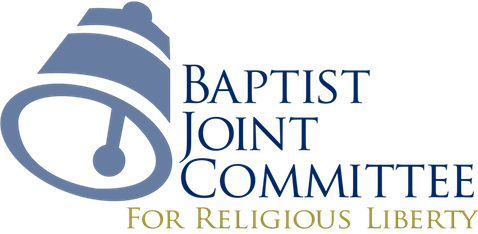April 1, 2015
FOR IMMEDIATE RELEASE
Contact: Cherilyn Crowe | Phone: 202-544-4226 | Cell: 202-670-5877 | [email protected]
WASHINGTON – The Baptist Joint Committee for Religious Liberty led the diverse Coalition for the Free Exercise of Religion that worked for the passage of the federal Religious Freedom Restoration Act (RFRA), which became law in 1993.
Today, Executive Director J. Brent Walker released the following statement concerning RFRA legislation in Indiana and Arkansas:
—
The federal Religious Freedom Restoration Act and state RFRAs are important to ensure heightened protection for religious liberty for all. State RFRAs should mirror the delicate balance achieved in the federal law. Both Indiana and Arkansas passed legislation that falls short of that goal in several ways, tilting the balance in favor of religious claimants and against the government’s ability to protect other compelling interests. RFRAs allow us to protect religious liberty with an eye to the well-being of society and rights of third parties, including civil rights of the LGBT community and others.
The promise of America is a both/and expectation. Not either/or. That is, both religious liberty for all and non-discrimination. Achieving this is absolutely essential and possible.
First, using the federal RFRA standard, courts are uniquely suited to balance these interests case-by-case, providing each a fair hearing but guaranteeing neither victory.
Second, it is possible politically. Look to the recent compromise civil rights legislation with religious liberty accommodation in one of the reddest states in the country – Utah. (I know this may not be possible everywhere, but it is at least a hopeful start.)
Third, we can do it individually. We need to tone down our hyperbolic rhetoric and understand that our supposed “enemies” are really our neighbors and fellow citizens. For our conservative Christian friends, try loving your LGBT neighbors unconditionally and understand that providing them goods and services in the marketplace is an act of Christian hospitality, not an indication of approval of their nuptial decisions. To our LGBT friends, try extending grace to others who have religiously informed objections to same-sex marriage and not ask them, in their eyes, to participate in your marital ceremony. Give that privilege to businesses who will celebrate your marriage along with you.
We can make this happen and create a both/and world — judicially, politically and socially. If we don’t do it, all Americans — and America itself — will be the poorer.
—
Visit www.BJConline.org/RFRA for resources on RFRA, including information on the genesis of the law, a timeline of RFRA and court rulings after it became law, and a copy of a letter sent to senators asking them to support RFRA in 1993.
Visit www.BJConline.org/RFRA-Symposium to view panel discussions – featuring diverse perspectives – and keynote presentations from a day-long symposium on RFRA’s 20th anniversary in 2013. Keynote speakers include Doug Laycock, law professor and one of the drafters of the legislation, and Oliver “Buzz” Thomas, who chaired the coalition that worked for RFRA’s passage and who served as general counsel of the Baptist Joint Committee.
Click here for Walker’s February 2015 column: Do states need religious freedom legislation?
-30-
The Baptist Joint Committee for Religious Liberty is a 79-year-old, Washington, D.C.-based religious liberty organization that works to defend and extend God-given religious liberty for all, bringing a uniquely Baptist witness to the principle that religion must be freely exercised, neither advanced nor inhibited by government.





